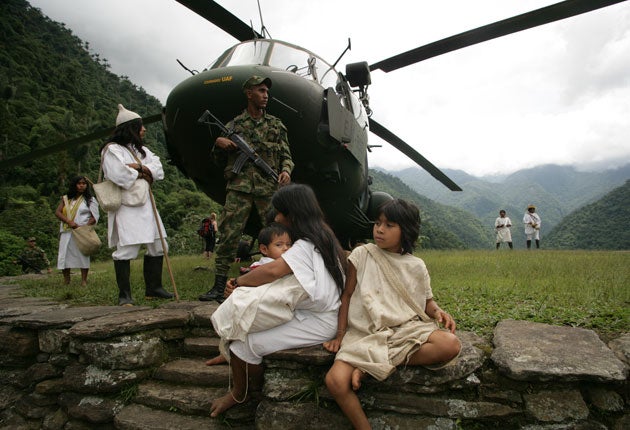UK hostage goes back to make film of ordeal
Mark Henderson, kidnapped by guerrillas in Colombia in 2003, has returned after receiving an email from one of his former captors

Your support helps us to tell the story
From reproductive rights to climate change to Big Tech, The Independent is on the ground when the story is developing. Whether it's investigating the financials of Elon Musk's pro-Trump PAC or producing our latest documentary, 'The A Word', which shines a light on the American women fighting for reproductive rights, we know how important it is to parse out the facts from the messaging.
At such a critical moment in US history, we need reporters on the ground. Your donation allows us to keep sending journalists to speak to both sides of the story.
The Independent is trusted by Americans across the entire political spectrum. And unlike many other quality news outlets, we choose not to lock Americans out of our reporting and analysis with paywalls. We believe quality journalism should be available to everyone, paid for by those who can afford it.
Your support makes all the difference.A British man kidnapped by Colombian rebels and held for three months has returned to the scene of his ordeal to meet his captors in the hope of achieving "closure".
Mark Henderson made international headlines when he was snatched, along with seven others, trekking near Colombia's 2,500-year-old Ciudad Perdida (Lost City) ruins in 2003. Taken by the National Liberation Army (ELN), the hostages were forced to walk for 18 hours a day through thick jungle, surviving on very little food and living in constant fear of death.
But an email received out of the blue from one of his kidnappers, known only as Antonio, 11 months after the event, prompted the 38-year-old to fly back to Colombia to meet his captors and make a film of the journey.
"I think most of my family thought I was mad," said Mr Henderson, who added that he returned to try to understand the reasons behind his kidnapping and to deal with post-traumatic stress. "When I was released I wanted to know everything about what I'd been involved in. I visited the Foreign Office, the police, spoke to the priest who's been involved in my release, but I still only knew about 60 per cent of my story." It has taken him five years to find the time and funding to complete the film, entitled My Kidnapper.
Seven people were kidnapped with Mr Henderson: a fellow Briton, Matthew Scott, who escaped and spent 12 days wandering in the mountains before being found, a German, a Spaniard and four Israelis. But only three agreed to return to Colombia with him.
The film – which is made up of footage shot on a shaky handheld camera, interspersed with news bulletins from the time of the kidnap and moving clips of Mr Henderson's parents' appeals for his release – was screened at the Sheffield Documentary Festival last week and will be broadcast on More4 early next year.
In one striking scene, Mr Henderson and Reini Wiegel, a German female hostage, are shown embracing their captors. ELN, a Marxist guerrilla group, has been operating since the 1960s. Kidnapping was so common in Colombia that in 2007 hundreds of thousands of people took to the streets to protest against civil conflict and to demand the release of the estimated 3,000 people being held.
Mr Henderson said that prior to returning to the jungle he sympathised with his captors, who claimed to use the kidnapping to publicise the massacres carried out by right-wing paramilitaries in the area and the persecution of indigenous villagers. But he denied he was suffering from Stockholm syndrome, in which hostages form an unlikely bond with their captors.
He said: "I definitely felt sympathetic to what they were fighting for. They are two people who shared an incredibly important part of my life. I'd held them in high esteem, thought they were people with ideals fighting for the common man."
Mr Henderson, who now works as a film director and lives in London, changed his opinion after he returned to Colombia. "The people in the mountains didn't want them kidnapping people. I was more angry and disillusioned. I don't think Antonio realised how much pain and misery he'd caused us and our families. A long way through filming he finally said sorry. That allowed me to forgive them."
Revisiting the scene of their capture was clearly traumatic for the group. Mr Henderson said: "The first night we were back there I slept in the same bed that I was taken from, and I was frozen with fear. I couldn't sleep all night."
The visit also revealed the tensions that emerged within the hostage group in 2003, from the Israeli man who planned to commit suicide to Ms Wiegel's attempt to kill one of the guards with a hairpin.
Join our commenting forum
Join thought-provoking conversations, follow other Independent readers and see their replies
Comments